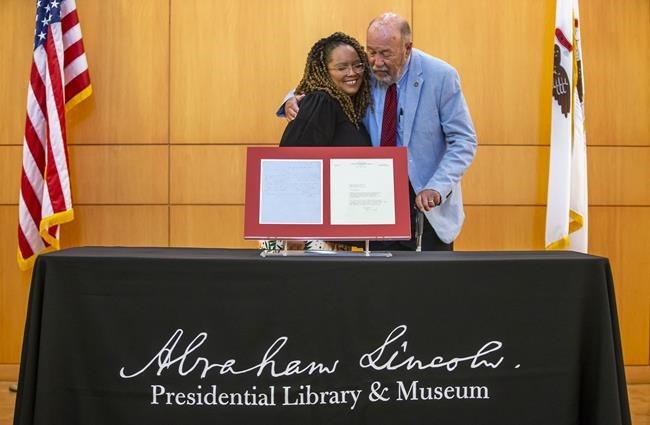
Christina Shutt, executive director of the Abraham Lincoln Presidential Library and Museum, hugs Guy Fraker, of Bloomington, Ill., attorney, author and Lincoln collector, after a ceremony in which he donated a 1854 handwritten letter from Lincoln for the collection of the ALPLM during a ceremony at the Abraham Lincoln Presidential Library in Springfield, Ill., Thursday, July 1, 2021. Abraham Lincoln's 1854 letter to Elihu Powell says that he has decided not to serve as a state representative again and according to scholars meant that he had his sights on the U.S. Senate. (Justin L. Fowler/The State Journal-Register via AP)
July 01, 2021 - 2:56 PM
SPRINGFIELD, Ill. (AP) — An 1854 letter hinting at Abraham Lincoln's transition from prairie legislator to political powerhouse, donated to the state of Illinois, was unveiled Thursday at the Abraham Lincoln Presidential Library and Museum.
The short missive, which a scholar once labeled “in a sense, the most interesting document Lincoln ever wrote,” explains his decision not to return to the Illinois House of Representatives so that he could remain viable for the U.S. Senate. The choice opened the door to the White House and Lincoln's preservation of the nation during the Civil War.
“Lincoln wrote it at a pivotal time in his life. Would he focus on the law or make a return to politics?" Lincoln library and museum executive director Christina Shutt said. "His decision changed history, so it’s appropriate for this letter to find a home at the library and museum dedicated to telling the story of Lincoln’s impact on the world.”
On Nov. 27, 1854, the circuit-riding attorney wrote friend and Peoria attorney Elihu N. Powell: “Acting on your advice, and my own judgment, I have declined accepting the office of Representative of this county.” He was responding to Powell's earlier reminder that service in the state House would prohibit an 1855 Senate run.
Capitol Hill was where Lincoln knew he needed to be to oppose the Kansas-Nebraska Act, the 1854 brainchild of Illinois Sen. Stephen A. Douglas allowing residents of newly established territories to decide whether to allow slavery. It included would-be northern states, thus turning on its head the key theme of three decades of compromise on the issue between North and South. Lincoln at the time was not an abolitionist but virulently opposed expansion of slavery.
Lincoln withdrew from the 1855 campaign but his legendary, if failed, 1858 battle to replace Democrat Douglas catapulted the lanky lawyer into the national spotlight and the White House two years later.
The letter also broaches his inevitable departure from the Whig Party, whose unsettled stance on slavery accelerated its demise. Nonetheless, he fretted over the Anti-Nebraska movement's radical stance on the issue, writing, “I fear some will insist on a platform, which I can not stand upon.”
Fittingly, the letter was donated by Guy Fraker, a lawyer and Lincoln collector from Bloomington, 135 miles (217 kilometers) south of Chicago. It was in Bloomington that Lincoln debuted his Republican leanings at the party's 1856 convention. He closed the proceedings with a rousing indictment of slavery in an oration which came to be known as the “Lost Speech,” so called, some say, because reporters were so enthralled they failed to transcribe it.
“Those of us who have been lucky enough to serve as caretakers for Lincoln letters and artifacts have an obligation to ensure they will be shared with the public for generations to come,” said Fraker, author of “Lincoln's Ladder to the Presidency: The Eighth Judicial Circuit.”
An office in Bloomington's courthouse square is also where Carl Sandburg, in his Pulitzer Prize-winning Lincoln biography, says Jesse Fell, who founded Bloomington's twin city of Normal and Illinois State University, suggested Lincoln reach for the brass ring in 1860.
The letter’s depiction of Lincoln’s metamorphosis prompted the “most interesting document” characterization by Paul Angle, a Lincoln scholar and historian of the Illinois State Historical Library from 1932 to 1945.
Lincoln served in the Illinois House from 1834 to 1842. In 1846 he was elected to serve one unremarkable term in Congress. He returned to his adopted town of Springfield and a lucrative law career. As a favor to an ally, he ran for and won an Illinois House seat in 1854 before deciding his future was elsewhere.
The letter will be displayed in the museum's Treasures Gallery for one month beginning July 7, replacing the current exhibit featuring the Emancipation Proclamation.
___
Follow Political Writer John O’Connor at https://twitter.com/apoconnor
News from © The Associated Press, 2021